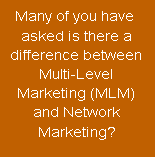

I get a lot of mail from non-networkers, who say that they enjoy the column but don’t always fully understand it. So here’s a beginners guide to what networking is and isn’t and a glossary of the terms that seem to cause the most confusion!
So what is Network Marketing? (NWM) It’s a marketing scheme that originated in America in the 1940’s. Now used by hundreds of thousands of companies world-wide It utilises an independent distributor base to replace the normal chain of distribution for a product.
Consider the usual way you would purchase a product. With all the recent publicity, let’s take suntan lotion as an example! It costs apparently 17 pence to manufacture a bottle which would retail at £9.99 upwards. If you buy it from a shop, the price you pay includes: Research, the manufacturer’s costs and profits, transportation to a wholesaler, the wholesaler’s costs and profits, transportation to a retailer, their costs and profits, advertising, sales and support staff costs and everyone’s overheads, rates, heat, light, phone etc. Network marketing turns that on its’ head. Instead, independent distributors buy products directly from the manufacturer and sell them straight to the customer. This means the manufacturer has more money to put into research and that they and the distributor can still both make handsome profits. The customer gets a more competitively priced product, with far better, personal service than is usually provided by most shops these days. Often products that began life as a networked products later make it to the supermarket, garage or health store shelves. The example that comes instantly to mind is Amway’s excellent compact soap powder, revolutionary in it’s day (1965) but now available anywhere manufactured by Proctor and Gamble. Many nutritional products are only available from networks initially. These companies have the budget to do leading-edge research.
The second part of a network marketing business is what has brought it to the attention of many respected trend and financial analysts. Distributors are able, if they wish to, to recruit new distributors and they receive a commission from the manufacturer on their recruit’s turnover. It’s as though a franchisee could not only allocate franchises to their colleagues but also receive a royalty on the turnover of those businesses WITHOUT the franchisees having to pay it themselves! Many of you have asked what is the difference between Multi-Level Marketing (MLM) and Network Marketing. This involves a little history, the powerful and normally ethical system can be abused. Many of the worst schemes became known as pyramids. In America the ethical companies in an effort to disassociate themselves from this type of abuse coined the name Multi-Level Marketing. Quite an accurate description of what we do in fact. For some reason that no-one seems to know, except perhaps a desire to do things differently from the Americans -- in the UK and Europe, the term NWM has always been much more widely used. Even NWM has received it’s share of bad press. In fact 99% of the bad press has centred not on NWM at all, but on illegal money, investment or insurance type schemes, that didn’t actually market any products.
These schemes are illegal in the UK and throughout most of Europe. Sadly that hasn’t stopped cowboys trying to jump on the bandwagon of an otherwise very interesting and very fast growing industry. Network marketing has been described as the franchising of the 21st century. Huge incomes are being made around the world, Much has been made of the multi-million income potential for distributors. As with any business, there are people in the UK who’ve make fortunes, but the average participants are not in it to make millions, just to substantially improve their lifestyle and work the hours they wish to work without spending half their life in an office.
Oh dear - how unusual - we ran out space.
Next month, I’ll start with the glossary that we’ve been asked for - some of the terminology that can cause confusion for new people.
This article was originally published in the UK in June 1998 under the title ‘Net Novices’
©1998 ESG


• Beginners Index • The Future • Subscribe to our Free Newsletter • Fun Stuff • Main Index • Email